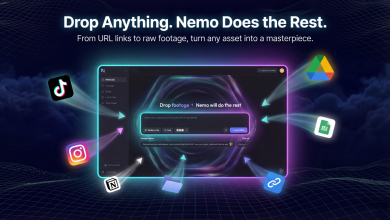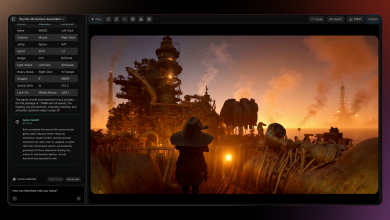
When I was made redundant during maternity leave, I faced a choice – try to rebuild my old career, or leap into something entirely new. With two small children and zero technical background, I decided to teach myself how to code – and, eventually, how to build AI solutions. It wasn’t easy, but it changed everything.
AI is redefining work faster than institutions can retrain people, and personal reinvention has become a survival skill. Many companies now demand that we use AI to make ourselves more effective in the workplace. Some are even requiring employees to showcase their AI skills, asking questions like “How have you used AI this week to make yourself more efficient and effective at work?”
The Budget Problem: AI Isn’t Just Software
Traditionally, companies allocate a per-head spend for software – typically £100-£200 per employee. But AI isn’t software in the conventional sense. It’s a fundamentally new way to be productive at your job. It doesn’t fit neatly into the software box. It’s much more than that.
Because of this mismatch, the standard per-head budget allocation is simply not enough, and people aren’t getting the AI tools they need to make themselves more efficient. This is going to detrimentally impact companies in the longer term because talented people will leave, and go work somewhere they can get exposure to the latest AI tools while simultaneously upskilling themselves.
The Scale of Change Ahead
The urgency of this challenge cannot be overstated:
- McKinsey projects that approximately 30% of current work hours could be automated by 2030, with an additional 12 million occupational transitions potentially needed in the US alone. Workers in lower-wage positions are up to 14 times more likely to need to change occupations than those in higher-wage roles.
- The World Economic Forum’s Reskilling Revolution initiative emphasizes that reskilling and lifelong learning have become urgent business priorities, with nearly 60% of workers expected to need upskilling by 2030.
- AI isn’t just replacing tasks – it’s reshaping entire roles, blending technical fluency with creativity and judgment in ways we’ve never seen before.
This isn’t only a worker issue – it’s a leadership issue. Companies that don’t invest in human capability risk losing agility, innovation, and their most talented people.
So What Needs to Be Done?
What should people do when their own companies won’t give them the tools they need to become AI-savvy? How can you upskill yourself effectively?
There are two sides to this answer:
- Companies need to increase their budget for per-head AI spending – remember, it’s not traditional software. This is an investment in innovation, not a cost.
- Employees (and everyone) need to start using AI to experiment and learn the fundamentals of what it can do for them in their roles.
Here’s How I Did It
I started my learning journey in AI with a mindset shift. As a 43-year-old mum of two young children with no technical background, even though the prospect of using a tool as powerful as AI excited me, it was terrifying and overwhelming. Figuring out where to start was one of the most challenging parts.
I ended up watching hours and hours of YouTube videos and following along with ‘simple’ builds. Each supposedly simple build took me weeks to get right. They make it look easy in the videos – it’s easy enough until you come across an error and don’t know how to resolve it. There was no getting around it: I had to learn the basics of coding.
But the biggest skill builder for me was getting my hands on it and really playing with the problem until I figured it out. I could have so easily given up after the eighth week of banging my head against a wall of errors. But then, I did it. I figured out why the error was there, adjusted it, and it worked!
It had been years since I felt so proud of myself. That was the moment I realised: I can do this.
I kept going, and a few months later, after building and showcasing my AI solutions, I received enough positive interest that I decided to go all in and set up an AI agency. Everyone thought I was crazy. Why was I spending all my time trying to build random AI solutions instead of sending my CV out and trying to get a job like a normal person?
But I knew this was a life skill I was learning – just like I insist my children learn to swim. This was my learn-to-swim moment.
The New Skills for the AI Age
AI literacy isn’t just for engineers anymore. It’s for everyone. And ‘learning how to learn’ is the hottest skill to develop right now.
“Upskilling” in the AI age isn’t just about learning to code – it’s about:
- Understanding how to ask the right questions of AI
- Translating everyday insights into AI-powered outcomes
- Blending creativity, ethics, and adaptability with technology
The 3Cs of AI Upskilling: My Framework for Personal Growth
I’ve developed my own framework for navigating this transformation -the 3Cs of AI Upskilling: Curiosity, Capability, and Confidence.
- Curiosity – The Foundation of Learning
Curiosity is where it all begins. Without genuine curiosity about how AI works, what it can do, and how it might transform your specific role, you’ll struggle to find the motivation to push through the inevitable challenges. In my case, curiosity kept me watching those YouTube tutorials late into the night after my kids went to bed. It made me wonder, “What if I could build something that solves this problem?”
To cultivate curiosity:
- Experiment with AI tools regularly – use ChatGPT, Claude, or other AI assistants in your daily workflow
- Ask yourself: ‘How could AI make this task easier or more effective?’
- Follow AI developments in your industry -what are others building?
- Don’t be afraid to look foolish or ask ‘basic’ questions – everyone starts somewhere
- Capability – Building Practical Skills
Curiosity alone isn’t enough, you need to develop actual capability. This means getting your hands dirty with the technology, learning by doing, and building real things. For me, this meant learning Python basics, understanding APIs, and wrestling with error messages for weeks on end.
Capability isn’t about becoming a professional developer, it’s about developing enough technical literacy to collaborate effectively with AI tools, communicate with technical teams, and understand what’s possible. You need to speak the language well enough to translate your ideas into reality.
To build capability:
- Start small—pick one AI tool and master it before moving to the next
- Build something tangible, even if it’s simple – a chatbot, a workflow automation, a data analysis tool
- Embrace failure as learning – every error message teaches you something
- Document your learning journey – write down what worked, what didn’t, and why
- Join online communities where you can ask questions and learn from others
- Confidence – Trusting Yourself in the AI Age
This is perhaps the most underrated element. Confidence doesn’t mean you know everything – it means you trust your ability to figure things out. After eight weeks of struggling with that first AI build, when I finally solved the error, the confidence I gained was transformative. It told me: “You can do hard things. You can learn. You can adapt.”
Confidence gives you the resilience to keep going when you’re stuck, the courage to share your work publicly, and the self-belief to pursue unconventional paths like starting an AI agency instead of sending out CVs.
To build confidence:
- Celebrate small wins – every solved problem is progress
- Share your work, even when it feels imperfect – feedback accelerates learning
- Remind yourself that everyone starts as a beginner, including the experts
- Reframe imposter syndrome as a sign you’re growing – discomfort means you’re learning
- Build a portfolio of projects that demonstrate your progress over time
How You Can Help as a Leader
Your role as a leader is essential to developing an environment where upskilling can take place. Culture, of course, plays a big part. Making the workplace a psychologically safe place for experimenting and learning is the first step to creating a workforce that’s motivated and isn’t afraid of the technology or how fast it’s going.
Yes, increasing the AI budget allocation per person is going to be expensive, but this is an investment in innovation, not a cost. Think of it this way: the alternative of losing your best people to competitors who do provide these tools is far more expensive.
We’ve all seen the quote: It’s not AI that’s going to take your job; it’s someone who’s using AI.
And don’t forget about making AI education accessible to people like me – parents, returners, and non-technical professionals. You can be at the forefront of an inclusive upskilling revolution.
The Time to Act Is Now
I’m an example of what can happen when you give people permission to reinvent themselves. Don’t sleep on it.
The best time to have started was five years ago. The second-best time is today.
Sources and Further Reading
- McKinsey Global Institute (2023). Generative AI and the Future of Work in America. Available at: https://www.mckinsey.com/mgi/our-research/generative-ai-and-the-future-of-work-in-america
- McKinsey Global Institute (2024). A New Future of Work: The Race to Deploy AI and Raise Skills in Europe and Beyond. Available at: https://www.mckinsey.com/mgi/our-research/a-new-future-of-work-the-race-to-deploy-ai-and-raise-skills-in-europe-and-beyond
- World Economic Forum (2025). How the Reskilling Revolution Will Prepare Future Workers. Available at: https://www.weforum.org/stories/2025/01/reskilling-revolution-preparing-1-billion-people-for-tomorrow-s-economy-2c69a13e66/
- World Economic Forum (2021). We Need to Reskill the Workforce, One Person at a Lifetime. Available at: https://www.weforum.org/stories/2021/06/reskilling-the-workforce-lifelong-learning/
- World Economic Forum (2021). Here’s Why Training Is Crucial to Drive the Post-COVID Recovery. Available at: https://www.weforum.org/stories/2021/01/calling-global-upskilling-movement/




